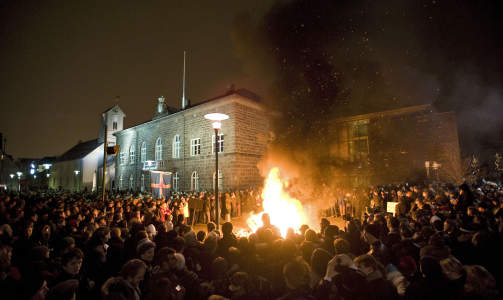- Joined
- Apr 13, 2011
- Messages
- 34,951
- Reaction score
- 16,311
- Gender
- Undisclosed
- Political Leaning
- Socialist
[/FONT][h=2]About Iceland and it’s democracy..[/h]
No news from Iceland… why?
How come we hear everything that happens in Egypt but no news about what’s happening in Iceland:
…
In Iceland, the people has made the government resign, the primary banks have been nationalized, it was decided to not pay the debt that these created with Great Britain and Holland due to their bad financial politics and a public assembly has been created to rewrite the constitution.
And all of this in a peaceful way.
A whole revolution against the powers that have created the current crisis. This is why there hasn’t been any publicity during the last two years: What would happen if the rest of the EU citizens took this as an example? What would happen if the US citizens took this as an example.
This is a summary of the facts:
- 2008, The main bank of the country is nationalized.
- The Krona, the currency of Iceland devaluates and the stock market stops.
- The country is in bankruptcy 2008.
- The citizens protest in front of parliament and manage to get new elections that make the resignation of the prime minister and his whole government.
- The country is in bad economic situation.
- A law proposes paying back the debt to Great Britain and Holland through the payment of 3,500 million euros, which will be paid by the people of Iceland monthly during the next 15 years, with a 5.5% interest.
- 2010, the people go out in the streets and demand a referendum. In January 2010, the president denies the approval and announces a popular meeting.
- In March the referendum and the denial of payment is voted in by 93%.
- Meanwhile the government has initiated an investigation to bring to justice those responsible for the crisis, and many high level executives and bankers are arrested. The Interpol dictates an order that make all the implicated parties leave the country.
- In this crisis an assembly is elected to rewrite a new Constitution which can include the lessons learned from this, and which will substitute the current one (a copy of the Danish Constitution).
- 25 citizens are chosen, with no political affiliation, out of the 522 candidates. For candidacy all that was needed was to be an adult and have the support of 30 people. The constitutional assembly starts in February of 2011 to present the ‘carta magna’ from the recommendations given by the different assemblies happening throughout the country. It must be approved by the current Parliament and by the one constituted through the next legislative elections.
So in summary of the Icelandic revolution:
Have we been informed of this through the media?
- resignation of the whole government
- nationalization of the bank
- referendum so that the people can decide over the economic decisions
- incarcerating the responsible parties
- rewriting of the constitution by its people
Has any political program in radio or TV commented on this?
- No!
[FONT='Trebuchet MS', 'Lucida Sans Unicode', 'Lucida Grande', 'Lucida Sans', Arial, sans-serif]The Icelandic people have been able to show that there is a way to beat the system and has given a democracy lesson to the world.[/FONT]
[FONT='Trebuchet MS', 'Lucida Sans Unicode', 'Lucida Grande', 'Lucida Sans', Arial, sans-serif]
Anonymous • About Iceland and it's democracy..
[FONT='Trebuchet MS', 'Lucida Sans Unicode', 'Lucida Grande', 'Lucida Sans', Arial, sans-serif]Wow i never even heard about it. Some great victories for the people of Iceland it sounds like. More people power! Just want the world needs!
Thoughts?
Comments?
Response? [/FONT]
